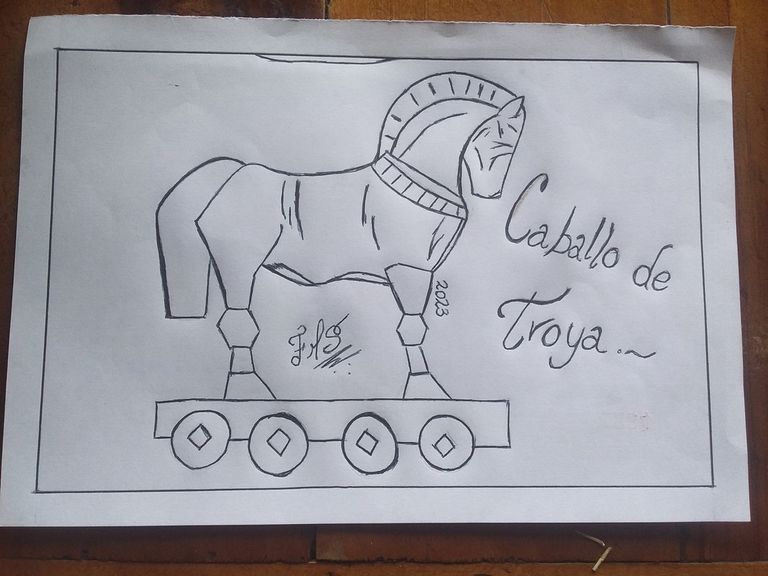
De acuerdo con la epopeya escrita por el poeta griego Homero titulada: "La Iliada", hubo una muy sangrienta guerra entre Grecia y Troya. La guerra se convirtió en leyenda y en ella se contaba que ésta empezó aproximadamente en el año 1700 a.C, contó con una duración de 10 años y que tuvo su fin con el incendio y destrucción de Troya por parte de los griegos.
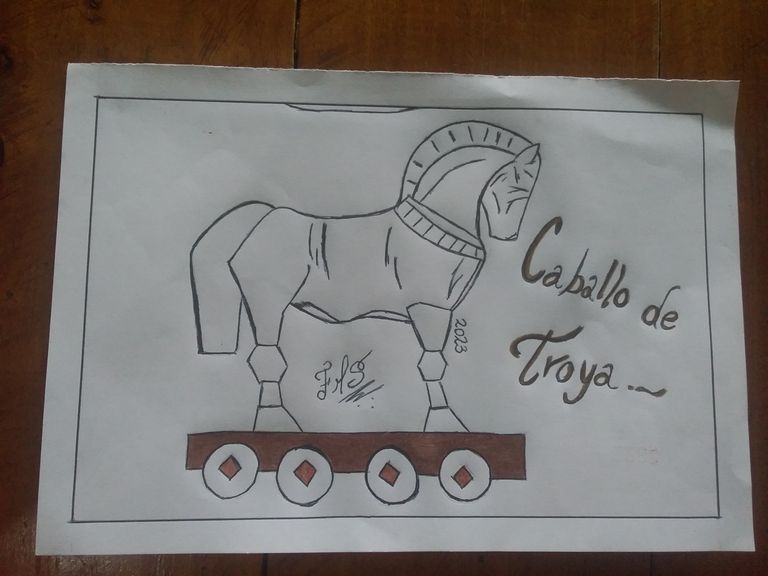
Según relata Homero, un general griego, de nombre Ulises al observar que al final de una década de sitiar a Troya no habían podido aún vencerles, pues los troyanos se mantenían encerrados y protegidos en su amurallada ciudad, y que además, debido a la lucha abierta que venían librando, las huestes griegas se encontraban debilitadas, cansadas y maltrechas; decidió consultar a un sacerdote y adivino griego de nombre Calchas, quien le aconsejó construir un enorme caballo de madera, pero con el detalle de que estuviera hueco y que permitiera, así ocultar, en su interior, un gran número de soldados y a los jefes más valientes.
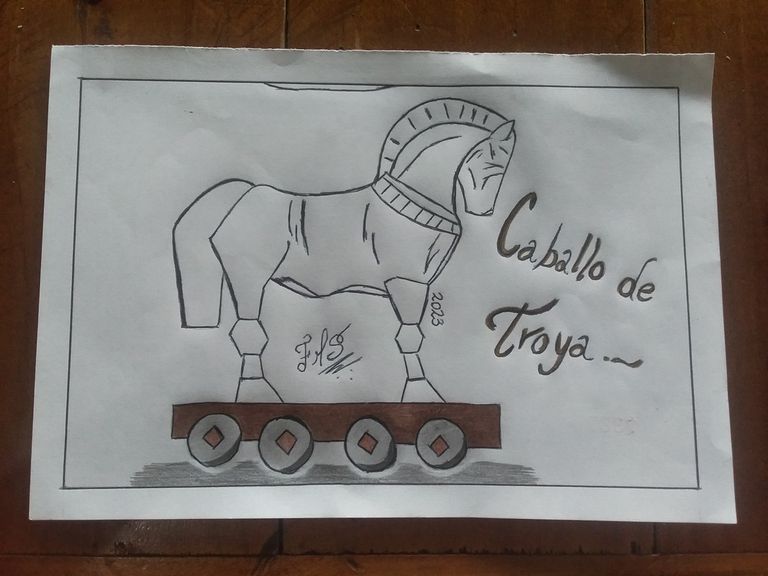
Ulises siguió el consejo del sacerdote y mandó a construir el caballo sobre una plataforma con ruedas, para facilitar su traslado una vez ocultos los soldados dentro de él. No hay acuerdo en cuánto a la cantidad de soldados que se ocultaron en su interior, varían según autores de entre 21 a 3.000 soldados. El caballo se dejó a las puertas de la amurallada ciudad y los griegos aparentaron haberse ido. Los troyanos creyendo que se trataba de un obsequio lo pasaron a su ciudad, para celebrar lo que consideraron su victoria sobre sus enemigos.
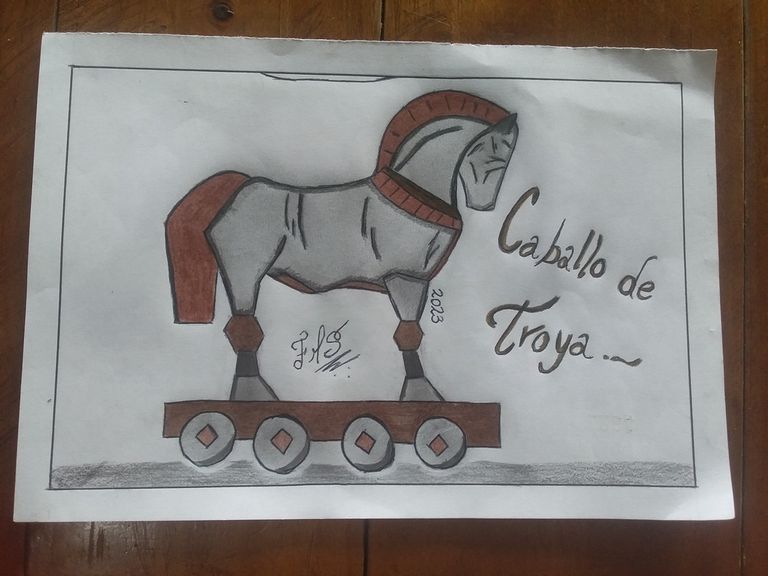
Debido a los grandes y desenfrenados festejos que hicieron los troyanos, creyéndose vencedores de tan extensa y cruel guerra, se encontraban extenuados para el momento en el que los soldados griegos comenzaron a salir del vientre del caballo (que habían ubicado en el centro de la ciudad), y algunos de los soldados abrieron las pesadas puertas de la ciudad dándole entrada al resto del ejército que se encontraba oculto a las afueras. El ejército griego dio muerte a los troyanos, para posteriormente incendiar la gran ciudad que estuvo protegida heroicamente durante diez largos años. La estrategia de los griegos habia sido un éxito. La guerra había terminado a su favor.
Este episodio del "Caballo de Troya", histórico o no, empezó a formar parte de la cultura popular para hacer referencia y describir una estrategia engañosa en la que alguien esconde algo malicioso en algo aparentemente inofensivo, pero que en realidad tiene consecuencias negativas para quien lo acepte.
English: Title: Trojan Horse: Legend or Metaphor? By Florencia Renata.
According to the epic written by the Greek poet Homer entitled: "The Iliad", there was a very bloody war between Greece and Troy. The war became a legend and it was said that it began approximately in 1700 BC, lasted for 10 years and ended with the burning and destruction of Troy by the Greeks.

According to Homer, a Greek general named Ulysses observed that at the end of a decade of besieging Troy they had not yet been able to defeat them, because the Trojans were kept locked and protected in their walled city, and also, due to the open struggle they had been waging, the Greek hosts were weakened, tired and battered; he decided to consult a Greek priest and soothsayer named Calchas, who advised him to build a huge wooden horse, but with the detail that it was hollow and that it would thus allow to hide, inside, a large number of soldiers and the bravest chiefs.

Ulysses followed the priest's advice and had the horse built on a platform with wheels, to facilitate its transfer once the soldiers were hidden inside it. There is no agreement on how many soldiers were hidden inside, they vary according to authors from between 21 to 3,000 soldiers. The horse was left at the gates of the walled city and the Greeks appeared to have left. The Trojans believing that it was a gift passed it to their city, to celebrate what they considered their victory over their enemies.
Due to the great and wild celebrations that the Trojans made, believing themselves the victors of such an extensive and cruel war, they were exhausted by the time the Greek soldiers began to come out of the belly of the horse (which they had located in the center of the city), and some of the soldiers opened the heavy gates of the city giving entry to the rest of the army that was hidden on the outskirts. The Greek army killed the Trojans, then burned down the great city that was heroically protected for ten long years. The Greek strategy was a success. The war had ended in his favor.
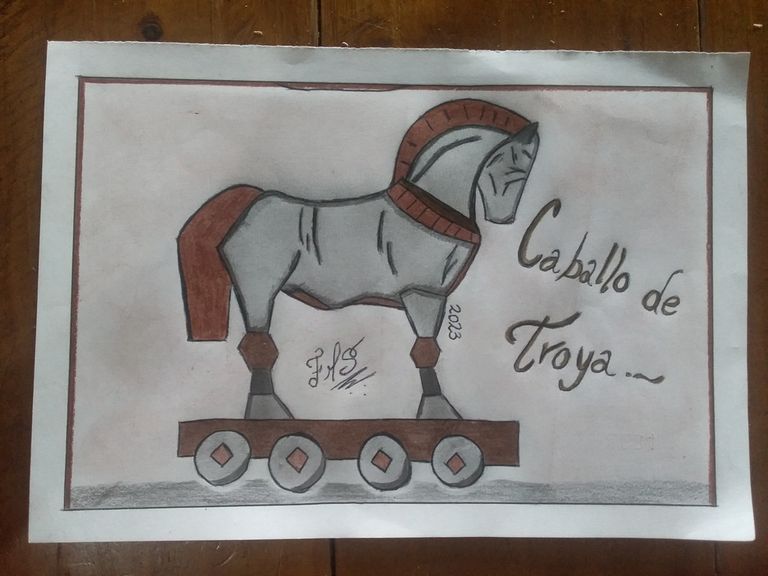
This episode of the "Trojan Horse", historical or not, began to become part of popular culture to refer to and describe a deceptive strategy in which someone hides something malicious in something seemingly harmless, but that actually has negative consequences for whoever accepts it.
Nota: Esta publicación fue realizada anteriormente en Hive. Pueden encontrarla en el siguiente enlace:
Congratulations, your post has been curated by @r2cornell, a curating account for @R2cornell's Discord Community.
Dear @flormarsal, your content was selected manually by curators @nalexadre, @ten-years-before to receive a curation from BeBlurt 🎉